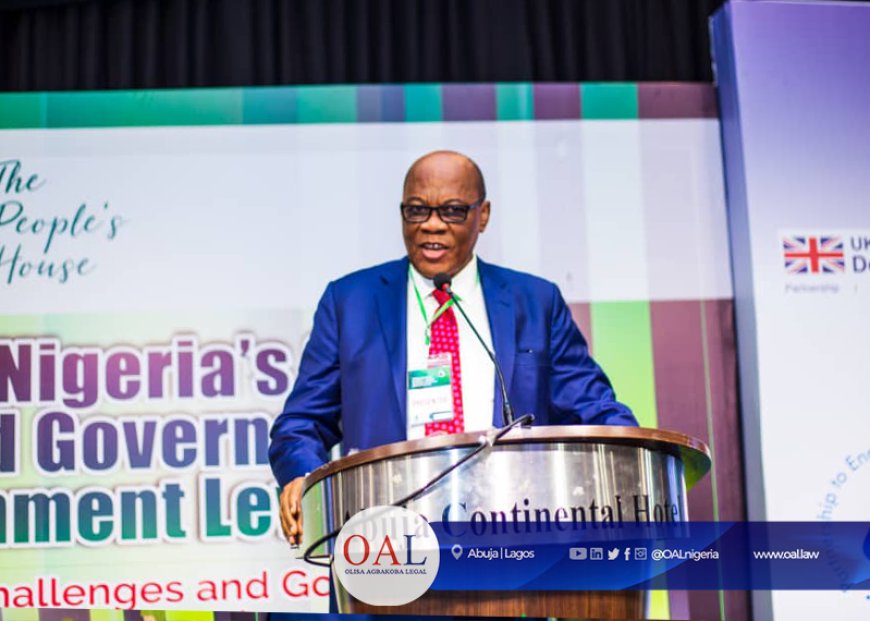Agbakoba advocates new constitution, fiscal federalism

A former president of the Nigerian Bar Association, Dr Olisa Agbakoba (SAN), has called for a complete overhaul of Nigeria’s governance system through a new constitution and genuine fiscal federalism, describing these reforms as the only viable paths to national prosperity.
Agbakoba made the disclosure while addressing journalists in Lagos during the presentation of his new policy paper titled “Devolution is the solution: Foundational Reform Agenda for Nigeria’s transformation.”
The legal luminary argued that the current 1999 constitution, imposed by the military, is a “cracked foundation” incapable of supporting true federalism or economic growth.
He described Nigeria’s governance as a “unitary federation”, noting that while the federal structure controls 97 per cent of national revenues, 90 per cent of governance responsibilities, including 774 local governments and 35 of 36 states, depend entirely on federal transfers.
“No amount of economic fine-tuning can succeed within such a centralised structure,” Agbakoba said.
He maintained that President Bola Tinubu’s economic reforms, including subsidy removal and exchange rate liberalisation, are technically sound but are trapped in a dysfunctional political system.
“You cannot fix economic problems with economic solutions when the root cause is political. Twenty-five years of constitutional amendments have failed because you cannot amend your way out of a flawed foundation,” he warned.
Agbakoba proposed a new constitution based on popular sovereignty, fiscal autonomy, and devolution of powers.
Under his model, the federal government would handle national matters such as defence, foreign affairs, currency, and immigration; states would manage resources, security, electricity, and education; while local governments would oversee primary education, water, and sanitation.
Fiscal federalism, he said, is essential for national balance and economic growth.
He argued that private sector empowerment should be the primary driver of the economy, with government exiting from commercial activities to release over N10 trillion in trapped capital.
According to his framework, reforming key sectors such as maritime, solid minerals, aviation, and land administration could unlock between N25tn and N35tn annually.
He highlighted inefficiencies in the maritime industry alone, which he said cost the country over N11tn per year, and suggested that privatisation and passage of the ports and harbours bill could generate N5tn–N7tn.
Agbakoba also emphasised the potential of solid minerals like lithium and rare earths, estimating N45tn annually if states manage resources efficiently, as well as Nigeria’s space industry, which he projected could generate $50bn (₦75tn) yearly.
He called for the commercialisation of space initiatives and reform of outdated land laws to unlock “dead capital” for credit and mortgage markets.
Further, he advocated full implementation of the Oronsaye report to merge or scrap redundant agencies and reduce federal ministries from 50 to 18, a move he said could save N10tn annually.
He stressed that economic growth depends on empowering states and local governments to drive development, arguing that “economic reform without political restructuring produces technically correct policies trapped in dysfunctional structures.”
Agbakoba projected that with proper devolution, Nigeria could achieve 10–12 per cent annual GDP growth and a N500 trillion national budget within a decade.
Looking ahead, he described the 2027 general election as Nigeria’s last peaceful opportunity for transformation and urged presidential aspirants to commit to constitutional replacement, state policing, and 50 per cent resource derivation.
He concluded that Nigeria could enter a “golden age” within five years if these reforms are implemented, achieving a 500tn budget and creating a 100-million-strong middle class.
“History will judge this generation by one test — whether we had the courage to restructure Nigeria when we had the chance,” Agbakoba said.
Agbakoba advocates fiscal federalism for Nigeria's prosperit









